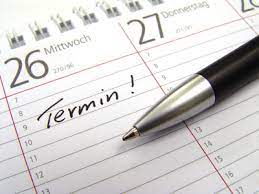 1. Write your weekly schedule in German: What do you do from Monday to Sunday, and when? What appointments do you have? When are you on vacation, when is your German course, when is your friend coming to visit? Make the entries in your daily schedule in German. 2. Keep a diary in German: Make a diary entry in German every day: When did you get up, when did you have breakfast, when did you go to work, what did you buy, who did you see, who did you talk to? etc. 3. Write text messages in German: If you have a partner or friend who also speaks German, write your text messages in German. Text messages are short and often consist of only a few words, which are often repeated. It doesn't take long to build up a "text message" vocabulary. It is a good opportunity to get used to writing in German. 4. Watch German TV: If you like to watch TV, why not watch German public television online? It is free and some shows are even available with German subtitles (Untertitel - UT). The subtitles don't match what's being said word for word, but you still get a pretty good idea of what's going on. A small number of shows have restricted access and can only be watched in Germany. So, even if you can't understand everything in the beginning, you will be able to pick out words that you already know. Over time it will become easier to tune in to German and understand more and more words and phrases. To watch German television online: - Enter ard.de into your browser - In the window that opens, click on ARD Mediathek - Scroll down to select movies, news shows, documentaries, comedies, etc. - or click on the looking glass and search for titles from A – Z 5. Read German books: If you prefer reading instead of watching TV, you can try Easy German Short Stories for Beginners 6. Play a game: Here are two suggestions for simple and easy to understand language games for beginners. They are great for training and reviewing vocabulary. AGO is a Q&A card game for beginners learning German. The first player to play all their cards, wins. Game instructions in English and German are enclosed. Langenscheidt Memory Game contains 200 word and picture cards. The cards are color coded and divided into 10 different topics relevant to everyday life, e. g.: family, sports, clothing etc. 7. Speak German: Often people are afraid to communicate in a foreign language that they can’t speak perfectly or they might feel a bit odd because they are not used to hear themselves speak in a different language. Here's a simple exercise to help you get passed this barrier: If you have no one to speak German with - speak to yourself. Describe what you are seeing, what you are doing, or have a silent inner dialogue on your bus ride to work. This way you will get used to speaking in a foreign language and after a while it won't seem so strange anymore. 8. Record yourself: Read sentences from the textbook or have a conversation with someone or yourself. Record yourself with your cell phone and then listen to yourself speak: How is your pronunciation? Are you satisfied? What are you doing well? What would you like to improve? Viel Spaß beim Üben! Comments are closed.
|

